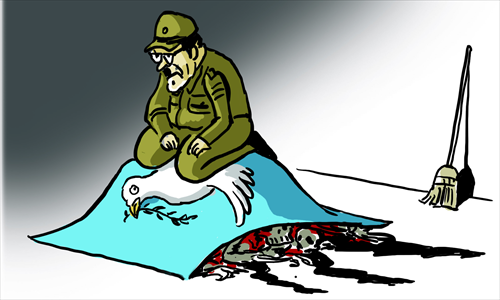Repeated shrine visits erode Japan’s pledge of pacifism

Illustration: Liu Rui/GT
Everybody knows the Yasukuni Shrine is a powerful symbol of Japan's militaristic past. Or do they? On August 15, 2011, then Japanese minister of finance Yoshihiko Noda argued that the Japanese Class-A war criminals, convicted by the International Military Tribunal for the Far East, were in fact not war criminals. Two weeks later, Noda became Japanese prime minister.
Noda was not alone. Last year, his successor, current Japanese Prime Minister Shinzo Abe told the Japanese Diet that aggression is not clearly defined among the academic and international community.
Noda and Abe are from different political parties, but if you look at the track record closely, you would find similar speeches from top Japanese officials many times. Deliberately or not, such things were ignored by Japanese Ambassador to the UK Keiichi Hayashi's response to the Chinese Ambassador Liu Xiaoming's article in The Telegraph regarding Yasukuni Shrine. In his article, Liu used the Harry Potter books as a metaphor, arguing that if militarism is like the lingering wizard Voldemort of Japan, the Yasukuni Shrine in Tokyo is a "horcrux," a term from the books, that preserves the spirit of militarism.
Hayashi downplayed Abe's visit to Yasukuni by describing China as responsible for the escalation of tensions in East Asia, and by emphasizing Japan's commitment to the values for democracy, human rights and peace. He simply said "a visit to a shrine cannot undo" those values and claimed that China's growing militarism was the real Voldemort of East Asia.
Hayashi's defense elicited an interesting question: If "a visit to a shrine cannot undo" Japan's "so deeply ingrained" values, then how many visits to that shrine would undo them?
The answer partly lay on Hayashi's statistics. He admitted that since the end of WWII, Japanese prime ministers have paid more than 60 visits to Yasukuni Shrine, and about half of the visits were made after the 14 Class-A war criminals were enshrined there in 1979.
So, after these over 60 visits to Yasukuni Shrine, let alone countless visits systemically made by Japanese cabinet members and parliament members, it seems this undoing is well underway.
Abe is on his way to attack Japan's pacifist constitution, first by enabling the right of collective self-defense, which is denied by Article 9 of the constitution, then as many believe, by seeking to undo Article 9 itself. The article contains the core ideal of Japan's peaceful constitution; that the Japanese people forever renounce the right of war.
The actions of Taro Aso, Abe's deputy prime minister, are also worrisome. He not only visited the Yasukuni Shrine, but also claimed Japan could learn from the example of Nazi Germany in the rapid revision of the constitution.
Article 9 is not only a resolution by the Japanese people, but also a promise to the rest of the world, especially to those victims of aggression by Japan during WWII. The visits to the shrine go directly against this pledge, especially the implicit honoring of the war criminals enshrined there.
Although the shrine visits are carried out in a private capacity, they also symbolically infringe on the principle of separation of church and state enshrined in the Japanese constitution, implicitly endorsing to State Shinto practices that empowered Japanese imperialism.
In his essay, Hayashi repeated Abe's statement that his visit to Yasukuni is to "renew the pledge that Japan shall never again wage war … and by no means to pay homage to war criminals or to praise militarism." That is very strange. Can you imagine a German leader paying a visit to a pantheon enshrining Adolf Hitler, Joseph Goebbels, Heinrich Himmler and other Nazi criminals to "renew the pledge" that Germany shall never wage a war again?
As a supporter of peace and friendship between China and Japan, I truly agree with the principle that the people of China and the people of Japan should treat each other with friendship generation by generation.
But I believe that one of the important bases is thoroughly criticizing Japan's militaristic past. Also, I don't think any true reconciliation can be achieved by one side's glorification of war crimes and asking the other side, China, to ignore it.
Hayashi argued that the ghost of militarism of seven decades ago no longer exists. Not so fast. This reminds me of when 2009, a Canadian asked Toshio Tamogami, a retired Japanese Air Self-Defense Force general who claims that Japan is the victim rather than a perpetrator of WWII, why he praised the souls enshrined in Yasukuni Shrine. The Canadian said, "Do you know if you were in Germany, you would be arrested for doing so?" The right-wingers surrounding Tamogami immediately yelled at the Canadian, who ran into trouble for his simple statement of fact.
It seems that, given the lingering power of the Yasukuni Shrine, the spectre of militarism in Japan is quite active.
The author is a freelance writer based in Beijing. opinion@globaltimes.com.cn